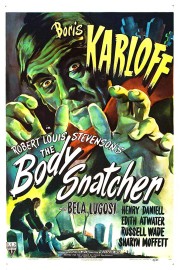The Body Snatcher
To a certain degree, producer Val Lewton’s supernatural thrillers would qualify as “elevated horror” if they were made now. Yes, they sometimes contain jump scares and horror movie tropes, but they are ultimately about the characters and stories they tell, and the psychological effects of the events of those stories. I’ll be honest, the idea of “elevated horror” is silly, but in the right hands, a movie like “The Body Snatcher” might have been in the same category of horror as “Hereditary” or “Midsommar.” This is one of the most nakedly macabre of Lewton’s productions, though, so it’s not quite the same thing as “Cat People” or “I Walked With a Zombie.”
Robert Wise’s “The Body Snatcher” is not an early adaptation of Robert Heinlein’s horror classic concept, but rather taken from the short story by Robert Louis Stevenson. Stevenson’s story, written in 1884, is about a doctor in 1831 Edinburgh who’s made a deal with the devil in acquiring bodies for his medical students. The doctor is Wolfe “Toddy” MacFarlane (Henry Daniell), whom is seen, early on, turning a way a young mother (Rita Corday) and her paraplegic daughter (Sharyn Moffett), who see him as their last hope to operate of her daughter. MacFarlane claims his teaching position keeps him too busy to perform the surgery, although his docket frees up when he is forced to offer one of his best students, Donald Fettes (Russell Wade), an assistant position for fear of Fettes dropping out because he can no longer afford his studies. One other piece of the dark puzzle of this narrative involves John Gray (Boris Karloff), a cab driver who also is known to rob graves, who will give up MacFarlane’s “dark secret” if he does not perform surgery on the young girl.
Stevenson’s original story was inspired by a real-life crime, but knowing that does not necessarily make it any easier for the film to hold’s one interest. Just writing the above plot synopsis out was exhausting, and overly convoluted. One thing about the best of Lewton’s productions is that, narratively, they were stripped down to an essential storyline that brought dark ideas out of character. “The Body Snatcher,” by virtue of being an adaptation of a short story, is a bit more dense than most of his films, and while it’s not a bad movie, I don’t know that I would put it on the same level as the ones he is most famous for. Wise’s film has great atmosphere, compelling moral dilemmas it presents, a creepy performance by Karloff as Gray, and a brief role for Bela Lugosi as Joseph (another assistant of MacFarlane), but it is more of a traditional horror premise than Lewton’s other thrillers in this era. There’s nothing wrong with that, and I can see some people appreciating it more because of that, but I prefer the stripped down, psychological terror in many of Lewton’s other films just a bit more than what he and Robert Wise delivered in “The Body Snatcher.”










